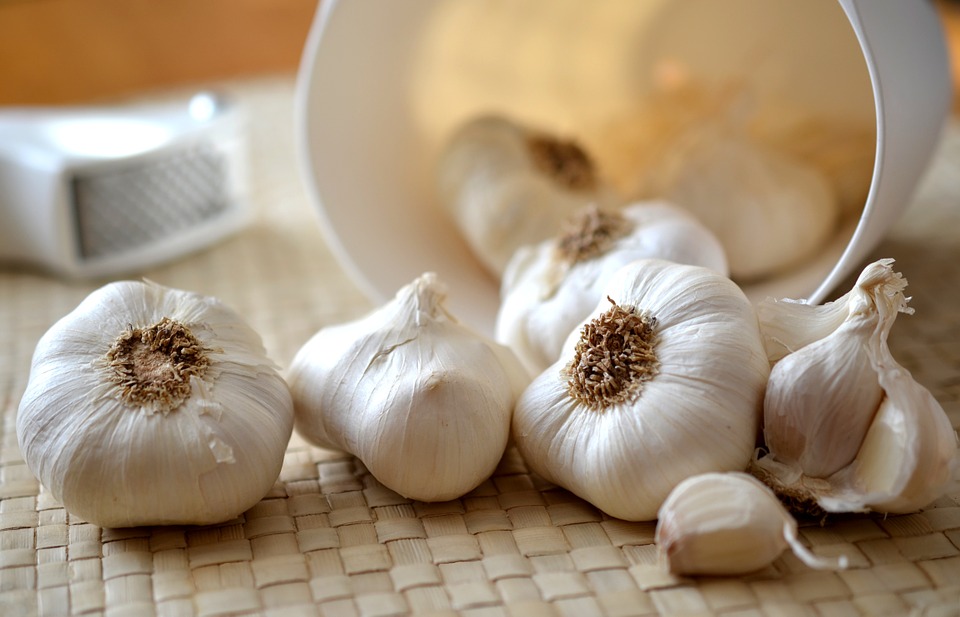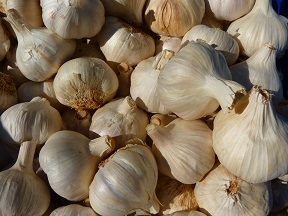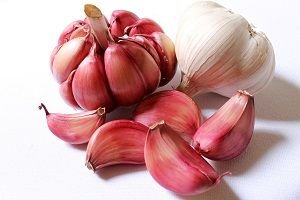
On my latest Antibiotic Resistance I got a question by @learnsthgnew about the potential of several plants such as garlic and onions in disease prevention. I really like garlic and I cook with it a lot, so I decided to take a closer look at garlic and it´s potential health benefits. Rather than just telling you about what I found, I will walk you through the process of finding and analyzing research. I am going into this without any expectations. This will be an interesting topic. So here we go.
Step 1: Google Scholar
Yes, a Google search engine. Whatever you may think, this engine is very helpful for finding research articles. As you can see in this screenshot, I typed in "garlic health". It is a very general search term, but I am just starting my initial research. This is a promising start. The first three results are review articles about the health benefits of garlic and a substance called Allicin.

The first article I am checking out is called Allicin and Other Functional Active Components in Garlic: Health Benefits and Bioavailability. Sadly this is neither a free article, nor can I access it through my university. However, I do have access to the abstract, which is a summary of the article. The abstract mentions antimicrobial activity, anticancer activity, antioxidant activity among others. It also refers to allicin again. Sadly I cannot read the full article and the research postest, so this is merely a starting point.
The next article I am going to look at is called Garlic: Health benefits and actions, another review article I sadly cannot access. However, the abstract sounds very exciting again. It states that garlic has been used as a remedy for infection, colds, diabetes, heart disease. Furthermore, it mentions that garlic has been investigated for clinical use to lower blood pressure and cholesterol. After reading these two abstracts, I think I am on to something. The next article Antioxidant Health Effects of Aged Garlic Extract, is a hit. This is a free article, so I not only have access to the article, but also the works cited.
At this point, I need to make a few decisions. There are many effects garlic seems to have and I guess I could spend weeks researching. Due to time constraints I decided to focus on the antibacterial effects of garlic (as was asked by @learnsthgnew).
Garlic And Antibacterial Effects
After reading a few abstracts once compound arises as the potential antibacterial component of garlic - allicin. I am now reading Alliumsativum (garlic) — A natural antibiotic. Again, I can only access the abstract to this study, and it is from 1983 (for health related articles prefer sources from the last 4-5 years), however, it gives us a clue. It states that garlic has been found to have broad-spectrum antimicrobial activity against clinically relevant bacteria. I found another article titled Allicin, a naturally occurring antibiotic from garlic, specifically inhibits acetyl-CoA synthetase. It is from the 90s but it identifies a specific target of allicin, acetyl-CoA synthetase, an enzyme found in plants, fungy, bacteria and also mammals. This study found that allicin inhibts acetyl-CoA in bacteria, plants and mamals. While this may seem great at first, it may be problematic that allicin is not selective for only bacteria (which means an increased risk for side-effects). However, lets keep looking for sources before drawing conclusions.

A study - Activities of Garlic Oil, Garlic Powder, and Their Diallyl Constituents against Helicobacter pylori - has found a dose-dependent effect of several garlic derivatives on heliobacter pliori diseases. It seems that there may be some promise of garlic to fight diseases such as acid reflux and stomach ulcers.
Here is a list of bacterial strains that garlic inhibits according to Protection against Helicobacter pylori and Other Bacterial Infections by Garlic.
Aerobacter, Aeromonas, Bacillus, Citrella, Citrobacter, Clostridium, enterobacter, Escherichia, Klebsiella, Lactobacillus, Leuconostoc, Micrococcus, Mycobacterium, Proteus, Providencia, Pseudomonas, Salmonella, Serratia, Shigella, Staphylococcus, Streptococcus and Vibrio
I think at this points I feel comfortable to say yes, garlic has antibacterial effects. Now, what do we do with this information. I found an interesting study called Antibacterial Potential of Garlic-Derived Allicin and Its Cancellation by Sulfhydryl Compounds. Sadly, I am confined to the abstract once more. The abstract states that garlic extract was more potent against staphylococcus than allicin. When comparing allicin to clinically used antibiotics, it become evident that allicin is not nearly as potent. I wish I could access the whole study because I think this may have some data that would be very useful for this post. Well, maybe I can find another study. I could not sadly. However, I found more studies that were confirming the antibacterial effect of garlic. For example Staphylococcal growth and enterotoxins (A—D) and thermonuclease synthesis in the presence of dehydrated garlic shows that dehydrated garlic inhibited the growth of Staphylococcus aureus as well as the production of several enterotoxins.

Therapeutic values of onion (Allium cepa L.) and garlic (Allium sativum L.) confirms therapeutic effects of garlic oils. This study also warns that such product should be consumed in limited quantities, as they were found to be inhibiting thiol group enzymes. However, there are also studies that lowered the expectations. Allylsulfide constituents of garlic volatile oil as antimicrobial agents demonstrates that garlic is more effective against certain fungi, rather than bacteria. However, this study focused on only two strains of bacteria, and did find inhibitory effects of garlic on one of the species at high doses.
The mode of action of allicin is not understood yet. This study - The mode of action of allicin: trapping of radicals and interaction with thiol containing proteins - indicates that the main way that allicin acts is not through antioxidant activity, but rather by interaction with SH containing enzymes by a thiol-disulfide exchange reactions.
I was hoping to find some more specific posts so I went onto NCBI and searched for allicin antibiotic, which showed me that there are efforts to derive antibiotics that mimic allicin action. Allicin-inspired thiolated fluoroquinolones as antibacterials against ESKAPE pathogens and Allicin-inspired pyridyl disulfides as antimicrobial agents for multidrug-resistant Staphylococcus aureus present such antibiotics. I will not follow this trail because I want to focus on garlic and its properties, rather than mimicing antibiotics. However, if you are interested, check out the two linked studies and search out "allicin antibiotics" on NCBI. I moved on to a more general search on NCBI, entering "garlic antibiotics" as my search term.

The first study I am looking it is called Antimicrobial and antioxidant properties of various Greek garlic genotypes, which shows that the effects of garlic are more pronounced in certain types of garlic. While this study focused only on Greece, this may give us an idea that some garlic is better than other. While Phytochemical and Biological Activities of Pseudocalymma elegans: A False Garlic does not talk about garlic, it examines the effects of substances responsible for the garlic like smell in Pseudocalymma elegans. Some of which, like diallyl trisulfide, are constituents in garlic or very similar. Diallyl Polysulfides from Allium sativum as Immunomodulators, Hepatoprotectors, and Antimycobacterial Agents showed that compounds found in garlic have a potentially liver-protecting effect, while having antibacterial action.
Summary
Well this was a lot of information. So let me try and summarize this. I found a lot of studies that showed antibacterial effects of garlic. Sadly, I could not find any clinical studies because this sounds very promising. I am honestly wondering why garlic is not used more often. Possible reasons I can imagine is people disliking garlic, flatulence and maybe allergies. But considering the possible effects of garlic, these seem like rather small sacrifices. An encouraging thing at this point: there is a lot of research done about garlic and its constituents. This is likely due to the fact that we are faced with a growing number of antibiotic resistant bacterial strains, and garlic has been shown to be effective a few resistant strains. While this survey has found that garlic has numerous health benefits, I would not recommend eating three gloves of garlic a day now. Rather than that, incorporate a little more garlic into your diet. When you make scrambled eggs for example, add a little garlic shortly before you serve the eggs - just as an example. It is important to not heat the garlic too much, because that would destroy many of the beneficial components. I hope this posts helps to answer your question @learnsthgnew. Certainly, I did learn something new.
I hope I was further able to walk you through the process of finding sources appropriate for a scientific argument (or, as in this case, a science-based and informed opinion). Please feel encouraged to check out the studies I cited, as well as, conducting a search on your own using Google Scholar and NCBI.

Smallprint
Thank you very much for reading today´s post. Leave an upvote if you liked it. If there is anything that you want to add or contribute please do so in the comments. Maybe you like some of my other posts so check out my blog.
Every picture is CC0, which means public domain and that it can be used by anybody without restrictions and without attribution.
While I do put a lot of effort into researching and writing my posts, the day only has so many hours and I have other commitments. There is a reason why I publish on Steemit and not in Nature. Please understand this post as an educated opinion and treat it as such. After all, my username is @lesshorrible and not "nothingbuttruth".
Again, thank you for reading and upvoting!
As always,
Cheers @lesshorrible!
I have had outbursts of herpes simplex virus since I was a kid, and no pharmaceutical concoction was as effective in preventing the herpes as garlic. With different pharmaceutical medications it usually took almost a week for sores to disappear. When I apply garlic to the sores they usually disappear in a day :)
Downvoting a post can decrease pending rewards and make it less visible. Common reasons:
Submit
I heard about using garlic for skin conditions. It is good to see that there are natural remedies that actually work and have scientific work supporting it. Thanks for the comment. Cheers!
Downvoting a post can decrease pending rewards and make it less visible. Common reasons:
Submit
Thank you for showcasing a great natural remedy and one of my favorite spices :)
Downvoting a post can decrease pending rewards and make it less visible. Common reasons:
Submit
I'm eating raw garlic betimes because I found of it;-). But using it for skin conditions is new to me. Regarding to the article I should consider to eat it much often.
Downvoting a post can decrease pending rewards and make it less visible. Common reasons:
Submit
Very interesting research,
I feel you that have spent a lot of time researching the usefulness of garlic, Hopefully your research can be useful for everyone, and this article I think is worthy of publication through scientific journals to be examined in detail about the benefits of onions white..
Good article
Downvoting a post can decrease pending rewards and make it less visible. Common reasons:
Submit
Thank you @nurulfazillah! I was focusing on the antibacterial effect of garlic, but there are other beneficial effects on blood pressure, etc. If you are interested I would suggest you follow the procedure I outlined above and you should find plenty of scientific sources. If you want I can take a look at whit onions if you want. It will take me a few days though cause I am currently working on a grant proposal. Cheers!
Downvoting a post can decrease pending rewards and make it less visible. Common reasons:
Submit
A well written and informative piece.
I came across a website that, although lacking scientific rigour, gives a good summary of the potential of garlic and allicin for laymen like me;
http://www.allicinfacts.com/garlic-studies/research-highlights/
Downvoting a post can decrease pending rewards and make it less visible. Common reasons:
Submit
Thanks for the comment @murray64! Personally I do not like such websites. However, they may be a good starting point for your own research (I sometimes use wikipedia to get an overview before I dive into journal articles). Take the claims made, and then use search engines like google scholar or NCBI to see how much evidence there are for them. They are both free to use and open to everybody. I understand that scientific journals sounds scary (I thought that I would not be smart enough to understand them when I started studying), but the abstracts are usually not too technical and should be informative for laymen. With this post I did not try to convince anybody of anything, I just want to show people that scientific work is easily accessible. There are a lot of weird claims out there that people buy because they think that they cannot access scientific work. But it really is accessible. I hope this post encourages people to go and look at scientific evidence. As you can see, science is based on data rather than opinion - I heard many claims that science is controlled by the government and big pharma. If so, why could I find so much science done on the health benefits of garlic?
Sorry for the elaborate answer... Anyways, thank you again for your comment. Have a good day! Cheers!
Downvoting a post can decrease pending rewards and make it less visible. Common reasons:
Submit
We use garlic frequently as an antibiotic!
Downvoting a post can decrease pending rewards and make it less visible. Common reasons:
Submit
How exactly do you do that? I have read a few extraction methods used for analytical purposes (like alcohol extraction, etc.). Cheers!
Downvoting a post can decrease pending rewards and make it less visible. Common reasons:
Submit
Holly Slavic Remedy! :D
Another Slavic thing, type sci-hub and you will find the black raven holding the keys of your paper. Don't type without the dash, only with the dash you will call the raven.
I never tried it, of course, this is just a legend that you can open any paper like this, but hey - it's just a legend you know.
Just don't be afraid of Cyrillic. In order to prepare you:
Јуст донт бе афратид оф Цирилиц
Downvoting a post can decrease pending rewards and make it less visible. Common reasons:
Submit
Haha yeah I heard of this legend @alexs1320 and I know of many people investigating it but I wanted to emphasize "kosher" ways of getting scientific sources. Thanks for your comment!
Cheers!
Downvoting a post can decrease pending rewards and make it less visible. Common reasons:
Submit
It's quite often employed in Russian cuisine, and, like yourself, I use it in my own cooking often.
That's interesting; it means it's mostly the garlic I use in salads, or (wonderful) dips like skordalia or tzatziki, that is of most benefit. Will keep that in mind!
Overall a great take on a post. It enlivens it somehow, explaining the topic and the way to do research at the same time. It's great!
Downvoting a post can decrease pending rewards and make it less visible. Common reasons:
Submit
This is absolutely correct. When I came across allicin, I was tremendously relieved. Now that I was able to treat my children with the most powerful and natural medicine out there. It pains me to think about all the ridiculous amounts of toxic flu shots that get around, and continue to infect.
Downvoting a post can decrease pending rewards and make it less visible. Common reasons:
Submit